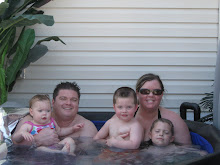Picture this. Dad comes home tired and stressed from a long day of work. He snaps at his wife who then yells at the kids. The kids are so low on the food chain that they have no one else to push around, so they kick the dog. The dog bites the cat and the cat scratches dad. Sound familiar?
It's a condition known as
Irritable Dad Syndrome. How many dads will agree with me that sometimes we come home and we are just exhausted from the day? Mustering enough energy to be cheerful with our spouse and playful with our kids feels like pushing a boulder up a hill.
This is a pattern I hear from a lot of dads and experience myself on many days. How can we as dads
lengthen our short fuses and keep from taking out our work frustrations on the ones we love the most?
Here are a few things I've personally found helpful in maintaining a calm, patient and loving response to my wife and children.
1. Realize that a dad's greatest victory is over himself.It was Plato who said "The first and best victory is to conquer self." As a father one of the truths I'm learning is that the only person I really have control over is me. Ever tried controlling your kids? It may work up to a point, perhaps while they're little and pulling on your pants leg, but inevitably it breaks down as young ones get distracted or older ones become defiant.
Controlling others is a lost cause. Controlling self is the main issue. As a father I can't blame others around me for the way I feel or the attitudes I adopt. I must assume full responsibility for my actions and responses to the people and events in my environment. If I focus on staying in control emotionally, then when I come home and the house is still messy, the kids are drawing on the walls and my spouse is worrying about our low bank account, I can summon the control I need to filter what I say to them and how I act toward them.
2. Recognize that a father's greatest decision is to be a dad to his kids.I have a ritual I go through when I arrive home and step up to my front door. Many times just before I turn the key to walk into the house, I pause, whisper a prayer to God and make a decision of my will right then and there to be a dad to my kids. In a split second I "renew my vows" to my children to protect, provide and love them no matter what. Being a father is a choice we make. We may or may not have planned our children, but God did. Being a dad requires that we re-decide every day that we will put effort into "being there" with and for our kids in all the situations life presents. I've found that renewing my decision refocuses me on the important job of raising my three kids to be healthy responsible adults, a task I can't delegate no matter how tired I am.
3. Remember that a dad's greatest resource is his own father in heaven.Sorry If I offend some here but I am a man of faith. That's just who I am. I'm not trying to convert anybody, so just relax, take a pill and hear me out. I've found in my life that just because I am a dad now, and find myself in a responsible role where I serve as a source of attention, affection and acceptance for others, doesn't mean that I don't also yearn for someone to do the same for me. I long to be able to have someone stronger and wiser reassure me that things are going to turn out okay, that I'm doing a good job or that that they're here if I need someone to talk to. Who doesn't need that? Okay, maybe robots don't, but I'm human. And I do. I suspect other dads do too whether they admit it or not.
I've found that relating to God, who has revealed himself as our heavenly father, strengthens and stabilizes me for the long journey of fatherhood. Jesus once said,
"I will not leave you as orphans. I am coming to you." I like that. Jesus said he wouldn't leave me alone in this world, that he wouldn't leave me fatherless. Just like I can't bear to imagine my children being fatherless, God can't imagine me, or you for that matter, having to do life without Him as our father.
I don't know about you, but I find strength in that. I lean on God, ask him to teach me how to be a dad, and then look to him to provide me with the knowledge and strength to raise my children with intelligence and love. These three helpful hints have helped me hone my skills of controlling negative emotions when they rise up within me at the end of a long busy day. Practice these for awhile and I predict you'll notice your fuse getting longer and your home life a little happier.


